Analyzing the Use of Social Media for Business Development and Growth
VerifiedAdded on 2022/10/16
|7
|1741
|86
Report
AI Summary
This report examines the use of social media in business, highlighting its evolution from a communication tool to a vital marketing platform. It discusses how social media enables businesses to connect with customers, gather insights, and improve customer service. The report covers the benefits of social media, including increased exposure, improved customer understanding, cost efficiency, and enhanced brand awareness. It also addresses challenges such as measuring value and integrating social media into business activities. The report concludes that social media is essential for modern businesses to reach customers, innovate strategies, and extend business survival, emphasizing the importance of adapting to changing consumer requirements and leveraging social media for product innovation and customer engagement. Desklib provides access to similar past papers and solved assignments for students.
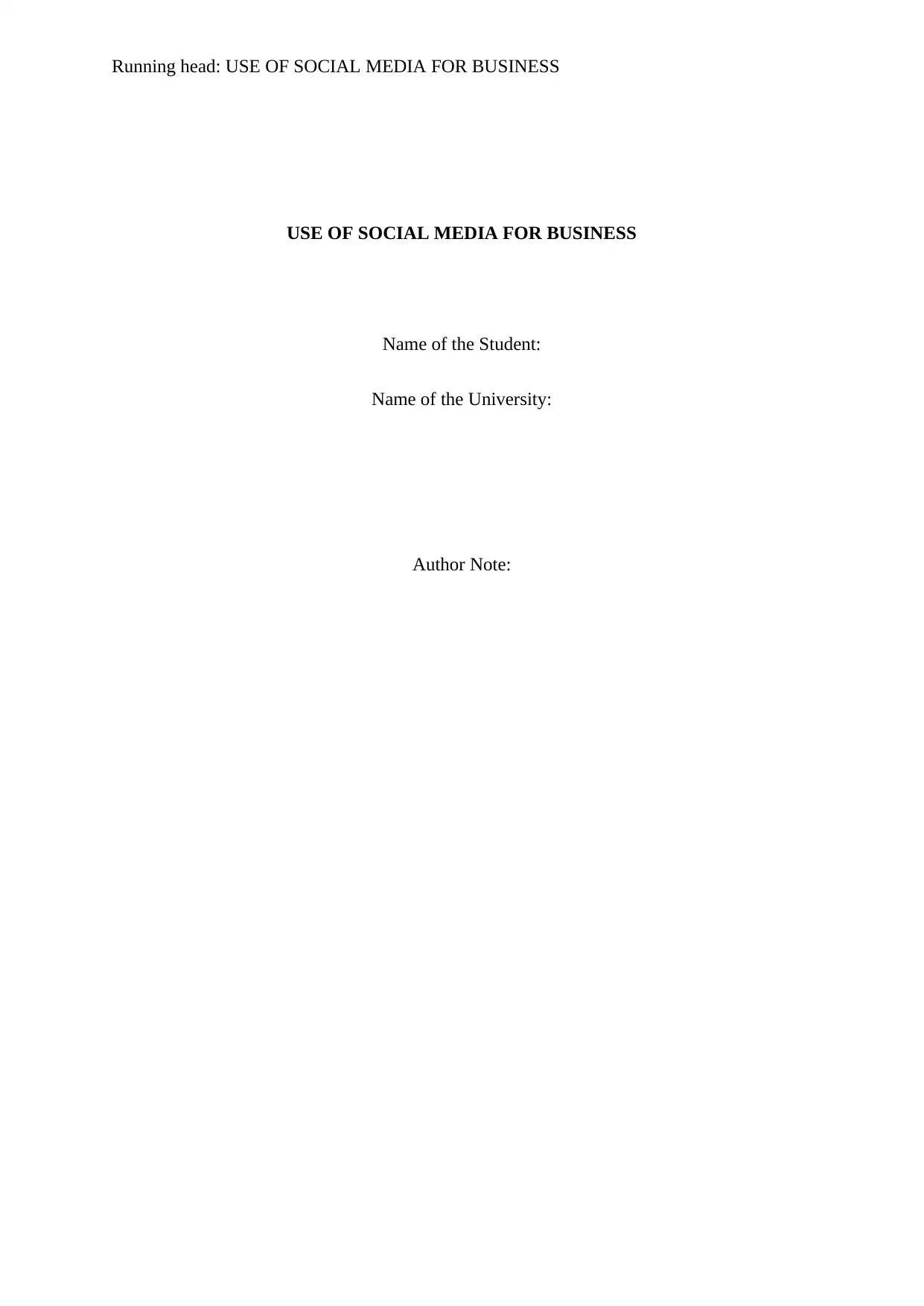
Running head: USE OF SOCIAL MEDIA FOR BUSINESS
USE OF SOCIAL MEDIA FOR BUSINESS
Name of the Student:
Name of the University:
Author Note:
USE OF SOCIAL MEDIA FOR BUSINESS
Name of the Student:
Name of the University:
Author Note:
Paraphrase This Document
Need a fresh take? Get an instant paraphrase of this document with our AI Paraphraser
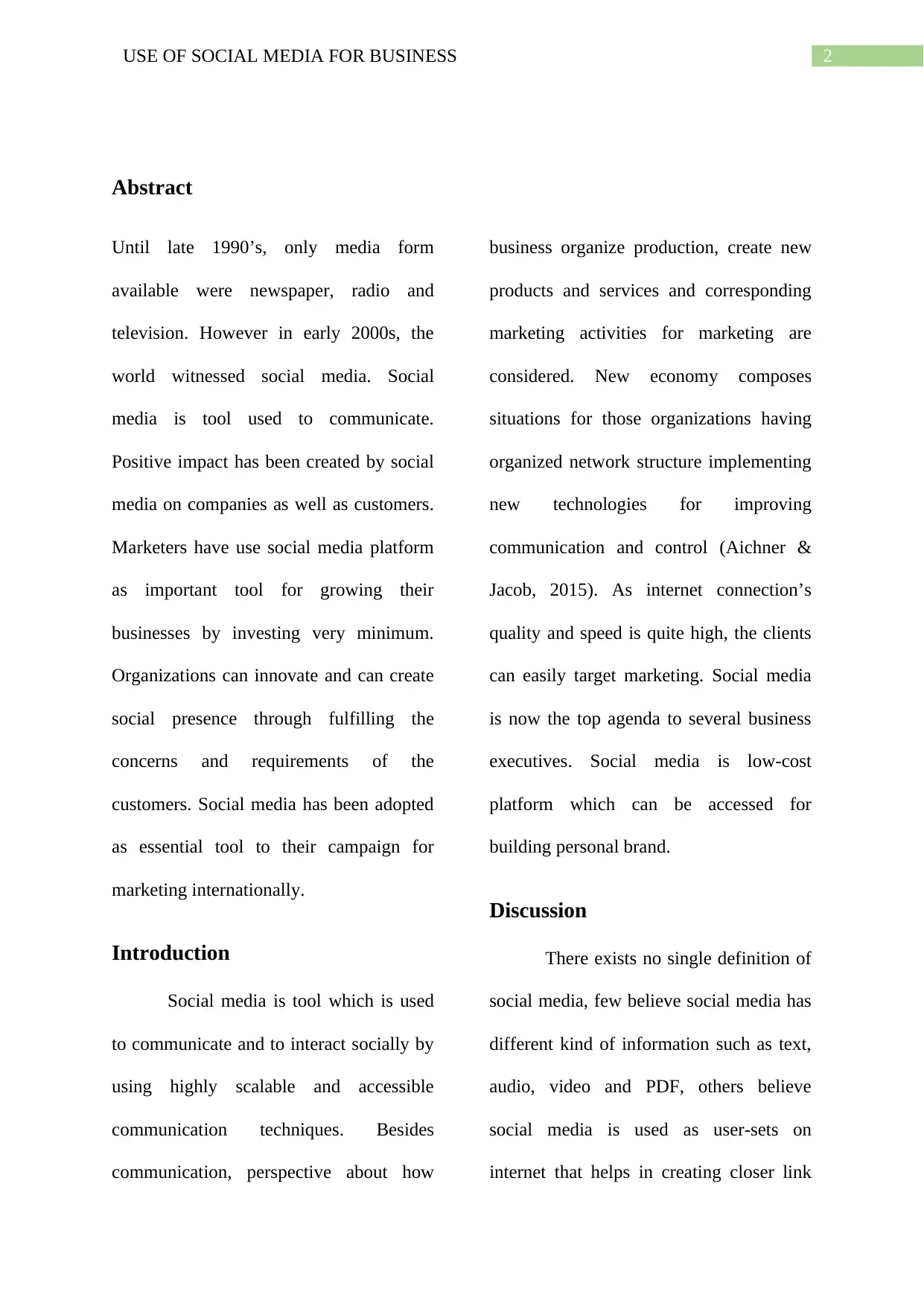
2USE OF SOCIAL MEDIA FOR BUSINESS
Abstract
Until late 1990’s, only media form
available were newspaper, radio and
television. However in early 2000s, the
world witnessed social media. Social
media is tool used to communicate.
Positive impact has been created by social
media on companies as well as customers.
Marketers have use social media platform
as important tool for growing their
businesses by investing very minimum.
Organizations can innovate and can create
social presence through fulfilling the
concerns and requirements of the
customers. Social media has been adopted
as essential tool to their campaign for
marketing internationally.
Introduction
Social media is tool which is used
to communicate and to interact socially by
using highly scalable and accessible
communication techniques. Besides
communication, perspective about how
business organize production, create new
products and services and corresponding
marketing activities for marketing are
considered. New economy composes
situations for those organizations having
organized network structure implementing
new technologies for improving
communication and control (Aichner &
Jacob, 2015). As internet connection’s
quality and speed is quite high, the clients
can easily target marketing. Social media
is now the top agenda to several business
executives. Social media is low-cost
platform which can be accessed for
building personal brand.
Discussion
There exists no single definition of
social media, few believe social media has
different kind of information such as text,
audio, video and PDF, others believe
social media is used as user-sets on
internet that helps in creating closer link
Abstract
Until late 1990’s, only media form
available were newspaper, radio and
television. However in early 2000s, the
world witnessed social media. Social
media is tool used to communicate.
Positive impact has been created by social
media on companies as well as customers.
Marketers have use social media platform
as important tool for growing their
businesses by investing very minimum.
Organizations can innovate and can create
social presence through fulfilling the
concerns and requirements of the
customers. Social media has been adopted
as essential tool to their campaign for
marketing internationally.
Introduction
Social media is tool which is used
to communicate and to interact socially by
using highly scalable and accessible
communication techniques. Besides
communication, perspective about how
business organize production, create new
products and services and corresponding
marketing activities for marketing are
considered. New economy composes
situations for those organizations having
organized network structure implementing
new technologies for improving
communication and control (Aichner &
Jacob, 2015). As internet connection’s
quality and speed is quite high, the clients
can easily target marketing. Social media
is now the top agenda to several business
executives. Social media is low-cost
platform which can be accessed for
building personal brand.
Discussion
There exists no single definition of
social media, few believe social media has
different kind of information such as text,
audio, video and PDF, others believe
social media is used as user-sets on
internet that helps in creating closer link
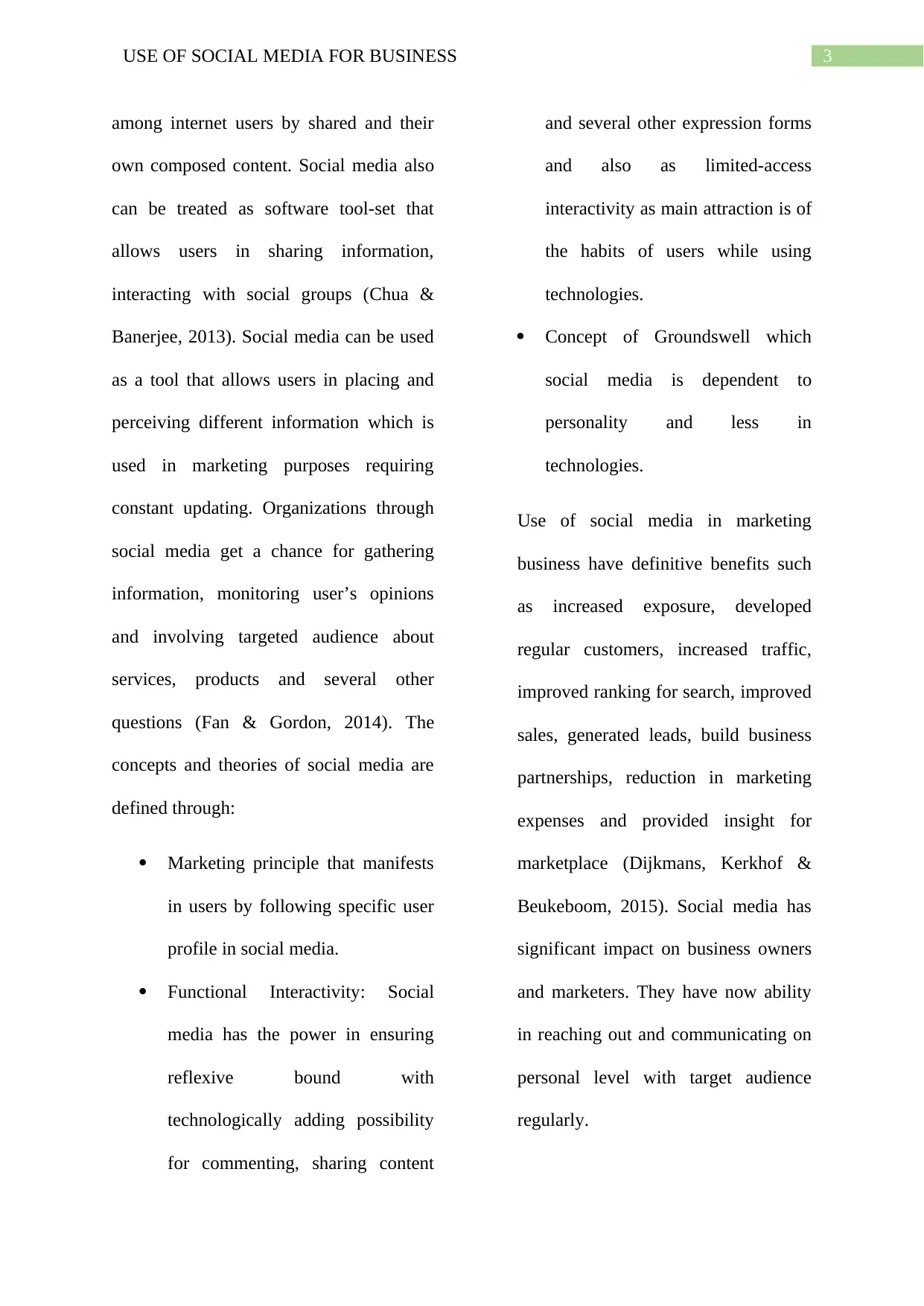
3USE OF SOCIAL MEDIA FOR BUSINESS
among internet users by shared and their
own composed content. Social media also
can be treated as software tool-set that
allows users in sharing information,
interacting with social groups (Chua &
Banerjee, 2013). Social media can be used
as a tool that allows users in placing and
perceiving different information which is
used in marketing purposes requiring
constant updating. Organizations through
social media get a chance for gathering
information, monitoring user’s opinions
and involving targeted audience about
services, products and several other
questions (Fan & Gordon, 2014). The
concepts and theories of social media are
defined through:
Marketing principle that manifests
in users by following specific user
profile in social media.
Functional Interactivity: Social
media has the power in ensuring
reflexive bound with
technologically adding possibility
for commenting, sharing content
and several other expression forms
and also as limited-access
interactivity as main attraction is of
the habits of users while using
technologies.
Concept of Groundswell which
social media is dependent to
personality and less in
technologies.
Use of social media in marketing
business have definitive benefits such
as increased exposure, developed
regular customers, increased traffic,
improved ranking for search, improved
sales, generated leads, build business
partnerships, reduction in marketing
expenses and provided insight for
marketplace (Dijkmans, Kerkhof &
Beukeboom, 2015). Social media has
significant impact on business owners
and marketers. They have now ability
in reaching out and communicating on
personal level with target audience
regularly.
among internet users by shared and their
own composed content. Social media also
can be treated as software tool-set that
allows users in sharing information,
interacting with social groups (Chua &
Banerjee, 2013). Social media can be used
as a tool that allows users in placing and
perceiving different information which is
used in marketing purposes requiring
constant updating. Organizations through
social media get a chance for gathering
information, monitoring user’s opinions
and involving targeted audience about
services, products and several other
questions (Fan & Gordon, 2014). The
concepts and theories of social media are
defined through:
Marketing principle that manifests
in users by following specific user
profile in social media.
Functional Interactivity: Social
media has the power in ensuring
reflexive bound with
technologically adding possibility
for commenting, sharing content
and several other expression forms
and also as limited-access
interactivity as main attraction is of
the habits of users while using
technologies.
Concept of Groundswell which
social media is dependent to
personality and less in
technologies.
Use of social media in marketing
business have definitive benefits such
as increased exposure, developed
regular customers, increased traffic,
improved ranking for search, improved
sales, generated leads, build business
partnerships, reduction in marketing
expenses and provided insight for
marketplace (Dijkmans, Kerkhof &
Beukeboom, 2015). Social media has
significant impact on business owners
and marketers. They have now ability
in reaching out and communicating on
personal level with target audience
regularly.
⊘ This is a preview!⊘
Do you want full access?
Subscribe today to unlock all pages.

Trusted by 1+ million students worldwide
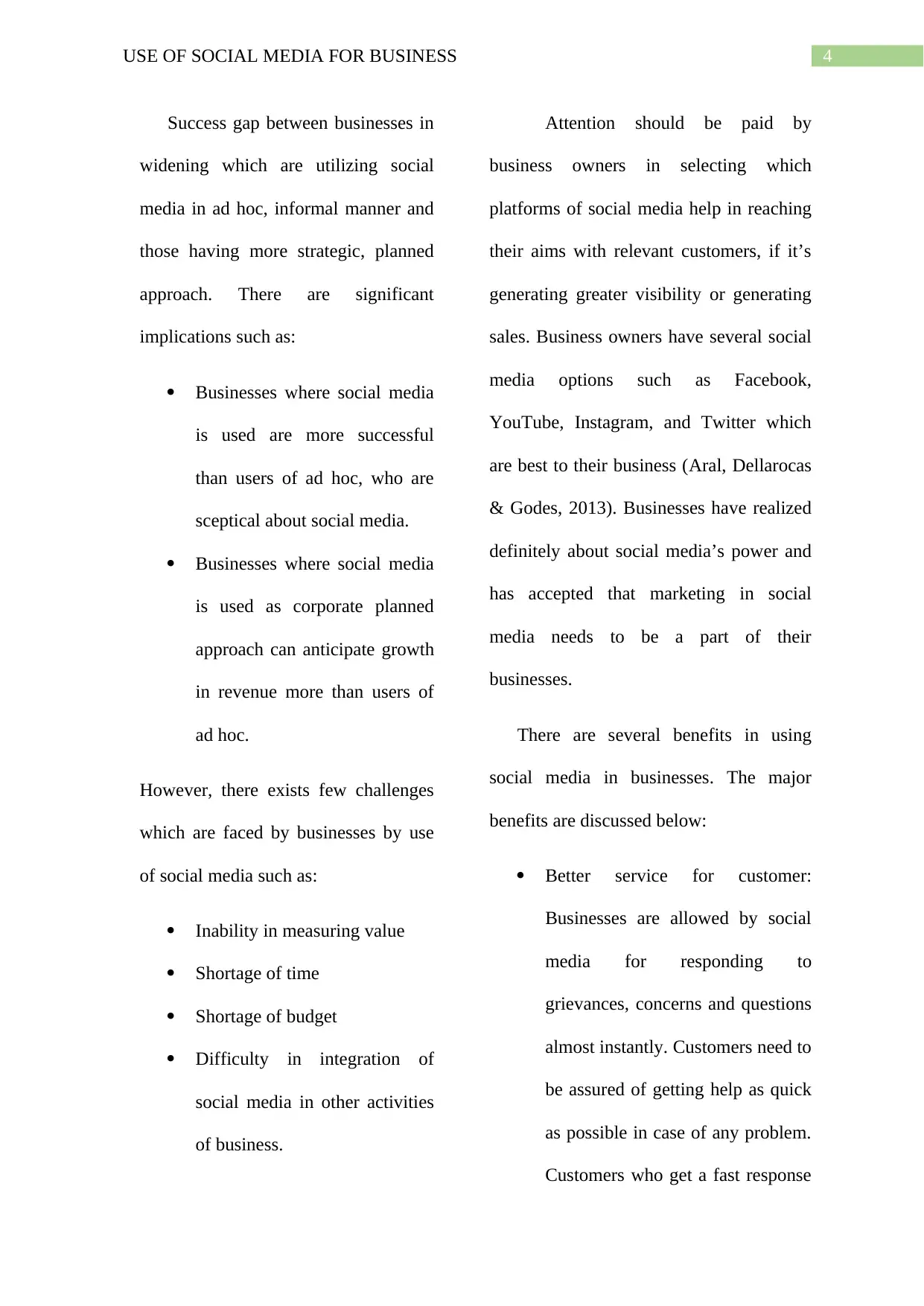
4USE OF SOCIAL MEDIA FOR BUSINESS
Success gap between businesses in
widening which are utilizing social
media in ad hoc, informal manner and
those having more strategic, planned
approach. There are significant
implications such as:
Businesses where social media
is used are more successful
than users of ad hoc, who are
sceptical about social media.
Businesses where social media
is used as corporate planned
approach can anticipate growth
in revenue more than users of
ad hoc.
However, there exists few challenges
which are faced by businesses by use
of social media such as:
Inability in measuring value
Shortage of time
Shortage of budget
Difficulty in integration of
social media in other activities
of business.
Attention should be paid by
business owners in selecting which
platforms of social media help in reaching
their aims with relevant customers, if it’s
generating greater visibility or generating
sales. Business owners have several social
media options such as Facebook,
YouTube, Instagram, and Twitter which
are best to their business (Aral, Dellarocas
& Godes, 2013). Businesses have realized
definitely about social media’s power and
has accepted that marketing in social
media needs to be a part of their
businesses.
There are several benefits in using
social media in businesses. The major
benefits are discussed below:
Better service for customer:
Businesses are allowed by social
media for responding to
grievances, concerns and questions
almost instantly. Customers need to
be assured of getting help as quick
as possible in case of any problem.
Customers who get a fast response
Success gap between businesses in
widening which are utilizing social
media in ad hoc, informal manner and
those having more strategic, planned
approach. There are significant
implications such as:
Businesses where social media
is used are more successful
than users of ad hoc, who are
sceptical about social media.
Businesses where social media
is used as corporate planned
approach can anticipate growth
in revenue more than users of
ad hoc.
However, there exists few challenges
which are faced by businesses by use
of social media such as:
Inability in measuring value
Shortage of time
Shortage of budget
Difficulty in integration of
social media in other activities
of business.
Attention should be paid by
business owners in selecting which
platforms of social media help in reaching
their aims with relevant customers, if it’s
generating greater visibility or generating
sales. Business owners have several social
media options such as Facebook,
YouTube, Instagram, and Twitter which
are best to their business (Aral, Dellarocas
& Godes, 2013). Businesses have realized
definitely about social media’s power and
has accepted that marketing in social
media needs to be a part of their
businesses.
There are several benefits in using
social media in businesses. The major
benefits are discussed below:
Better service for customer:
Businesses are allowed by social
media for responding to
grievances, concerns and questions
almost instantly. Customers need to
be assured of getting help as quick
as possible in case of any problem.
Customers who get a fast response
Paraphrase This Document
Need a fresh take? Get an instant paraphrase of this document with our AI Paraphraser
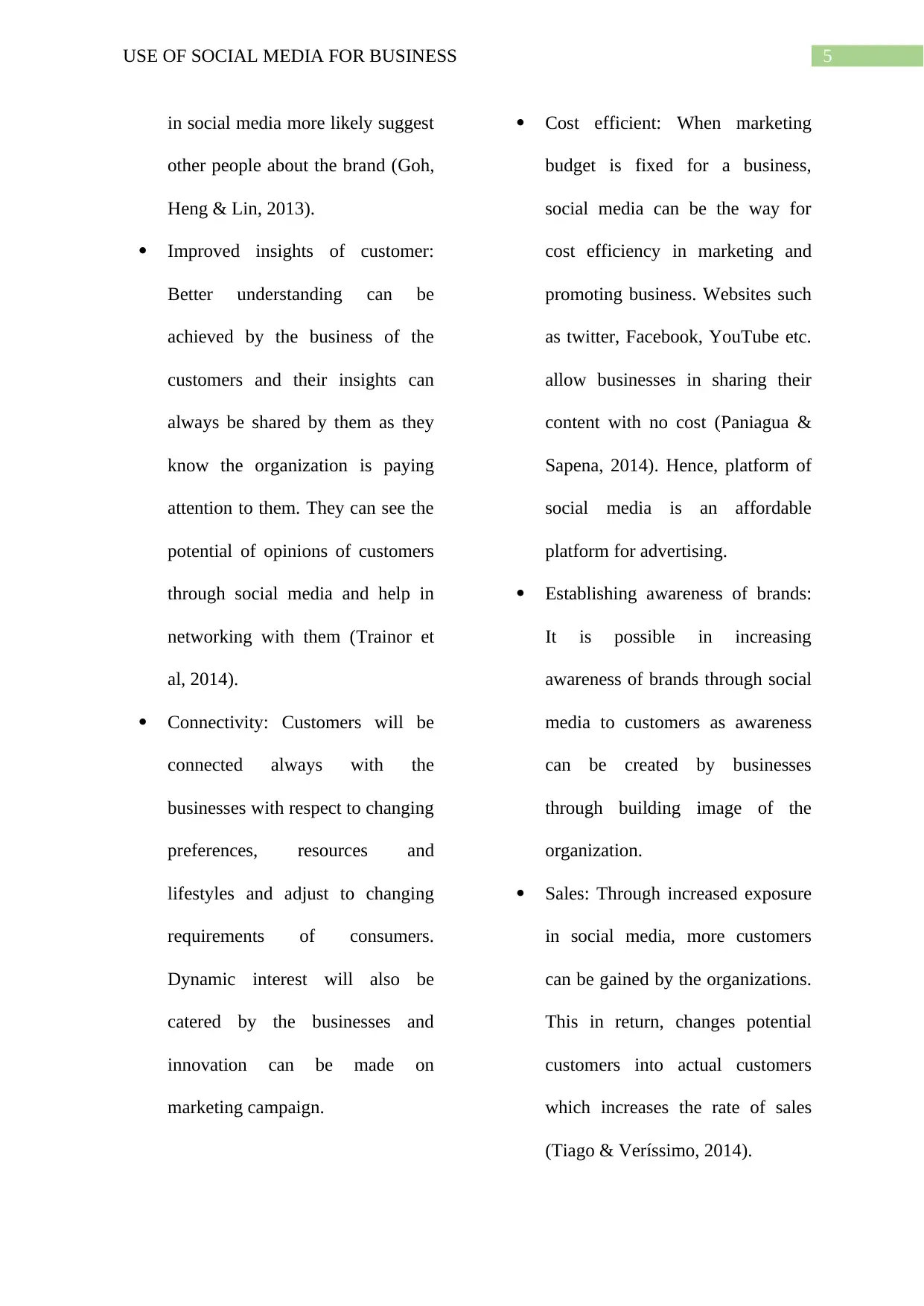
5USE OF SOCIAL MEDIA FOR BUSINESS
in social media more likely suggest
other people about the brand (Goh,
Heng & Lin, 2013).
Improved insights of customer:
Better understanding can be
achieved by the business of the
customers and their insights can
always be shared by them as they
know the organization is paying
attention to them. They can see the
potential of opinions of customers
through social media and help in
networking with them (Trainor et
al, 2014).
Connectivity: Customers will be
connected always with the
businesses with respect to changing
preferences, resources and
lifestyles and adjust to changing
requirements of consumers.
Dynamic interest will also be
catered by the businesses and
innovation can be made on
marketing campaign.
Cost efficient: When marketing
budget is fixed for a business,
social media can be the way for
cost efficiency in marketing and
promoting business. Websites such
as twitter, Facebook, YouTube etc.
allow businesses in sharing their
content with no cost (Paniagua &
Sapena, 2014). Hence, platform of
social media is an affordable
platform for advertising.
Establishing awareness of brands:
It is possible in increasing
awareness of brands through social
media to customers as awareness
can be created by businesses
through building image of the
organization.
Sales: Through increased exposure
in social media, more customers
can be gained by the organizations.
This in return, changes potential
customers into actual customers
which increases the rate of sales
(Tiago & Veríssimo, 2014).
in social media more likely suggest
other people about the brand (Goh,
Heng & Lin, 2013).
Improved insights of customer:
Better understanding can be
achieved by the business of the
customers and their insights can
always be shared by them as they
know the organization is paying
attention to them. They can see the
potential of opinions of customers
through social media and help in
networking with them (Trainor et
al, 2014).
Connectivity: Customers will be
connected always with the
businesses with respect to changing
preferences, resources and
lifestyles and adjust to changing
requirements of consumers.
Dynamic interest will also be
catered by the businesses and
innovation can be made on
marketing campaign.
Cost efficient: When marketing
budget is fixed for a business,
social media can be the way for
cost efficiency in marketing and
promoting business. Websites such
as twitter, Facebook, YouTube etc.
allow businesses in sharing their
content with no cost (Paniagua &
Sapena, 2014). Hence, platform of
social media is an affordable
platform for advertising.
Establishing awareness of brands:
It is possible in increasing
awareness of brands through social
media to customers as awareness
can be created by businesses
through building image of the
organization.
Sales: Through increased exposure
in social media, more customers
can be gained by the organizations.
This in return, changes potential
customers into actual customers
which increases the rate of sales
(Tiago & Veríssimo, 2014).
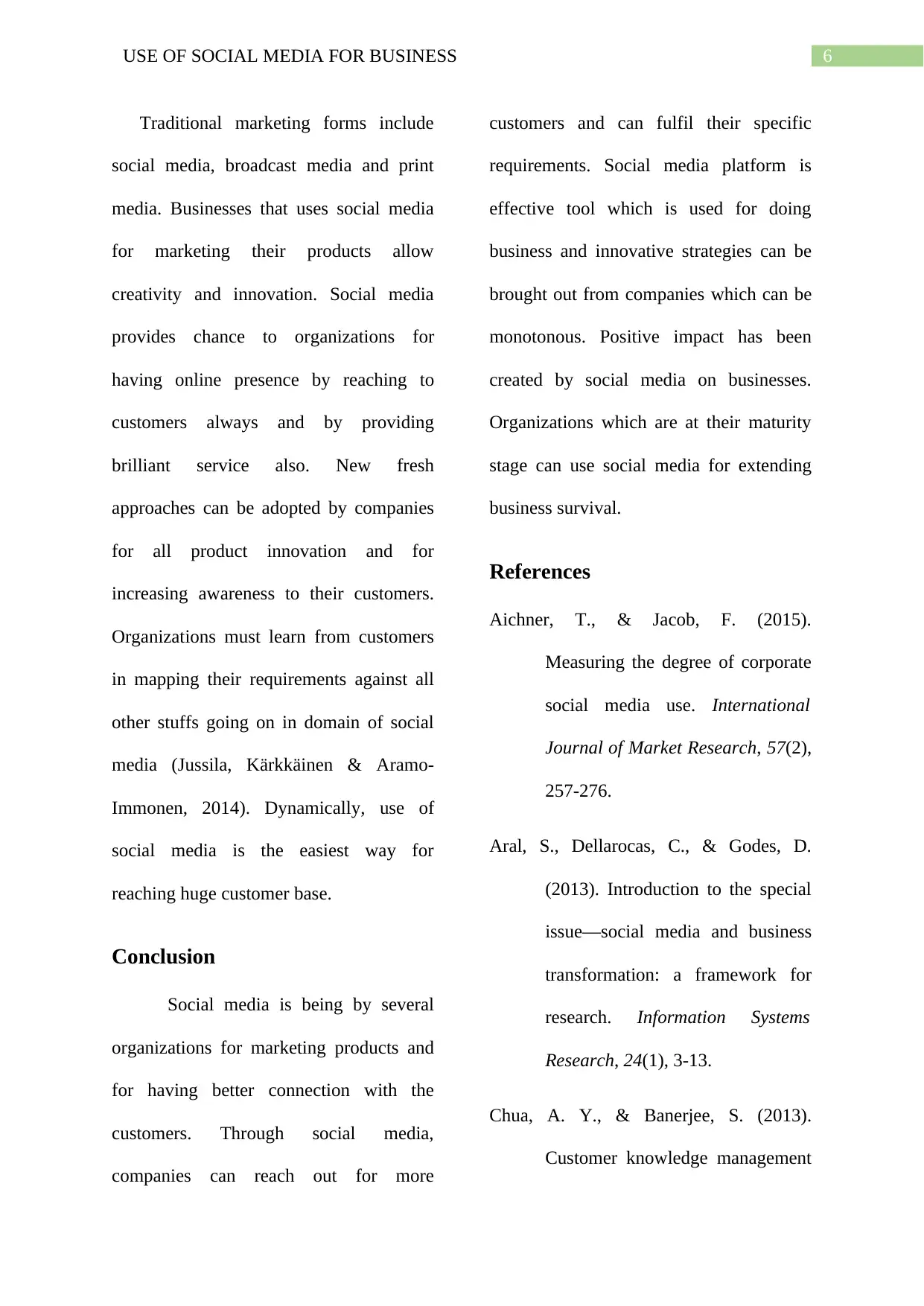
6USE OF SOCIAL MEDIA FOR BUSINESS
Traditional marketing forms include
social media, broadcast media and print
media. Businesses that uses social media
for marketing their products allow
creativity and innovation. Social media
provides chance to organizations for
having online presence by reaching to
customers always and by providing
brilliant service also. New fresh
approaches can be adopted by companies
for all product innovation and for
increasing awareness to their customers.
Organizations must learn from customers
in mapping their requirements against all
other stuffs going on in domain of social
media (Jussila, Kärkkäinen & Aramo-
Immonen, 2014). Dynamically, use of
social media is the easiest way for
reaching huge customer base.
Conclusion
Social media is being by several
organizations for marketing products and
for having better connection with the
customers. Through social media,
companies can reach out for more
customers and can fulfil their specific
requirements. Social media platform is
effective tool which is used for doing
business and innovative strategies can be
brought out from companies which can be
monotonous. Positive impact has been
created by social media on businesses.
Organizations which are at their maturity
stage can use social media for extending
business survival.
References
Aichner, T., & Jacob, F. (2015).
Measuring the degree of corporate
social media use. International
Journal of Market Research, 57(2),
257-276.
Aral, S., Dellarocas, C., & Godes, D.
(2013). Introduction to the special
issue—social media and business
transformation: a framework for
research. Information Systems
Research, 24(1), 3-13.
Chua, A. Y., & Banerjee, S. (2013).
Customer knowledge management
Traditional marketing forms include
social media, broadcast media and print
media. Businesses that uses social media
for marketing their products allow
creativity and innovation. Social media
provides chance to organizations for
having online presence by reaching to
customers always and by providing
brilliant service also. New fresh
approaches can be adopted by companies
for all product innovation and for
increasing awareness to their customers.
Organizations must learn from customers
in mapping their requirements against all
other stuffs going on in domain of social
media (Jussila, Kärkkäinen & Aramo-
Immonen, 2014). Dynamically, use of
social media is the easiest way for
reaching huge customer base.
Conclusion
Social media is being by several
organizations for marketing products and
for having better connection with the
customers. Through social media,
companies can reach out for more
customers and can fulfil their specific
requirements. Social media platform is
effective tool which is used for doing
business and innovative strategies can be
brought out from companies which can be
monotonous. Positive impact has been
created by social media on businesses.
Organizations which are at their maturity
stage can use social media for extending
business survival.
References
Aichner, T., & Jacob, F. (2015).
Measuring the degree of corporate
social media use. International
Journal of Market Research, 57(2),
257-276.
Aral, S., Dellarocas, C., & Godes, D.
(2013). Introduction to the special
issue—social media and business
transformation: a framework for
research. Information Systems
Research, 24(1), 3-13.
Chua, A. Y., & Banerjee, S. (2013).
Customer knowledge management
⊘ This is a preview!⊘
Do you want full access?
Subscribe today to unlock all pages.

Trusted by 1+ million students worldwide
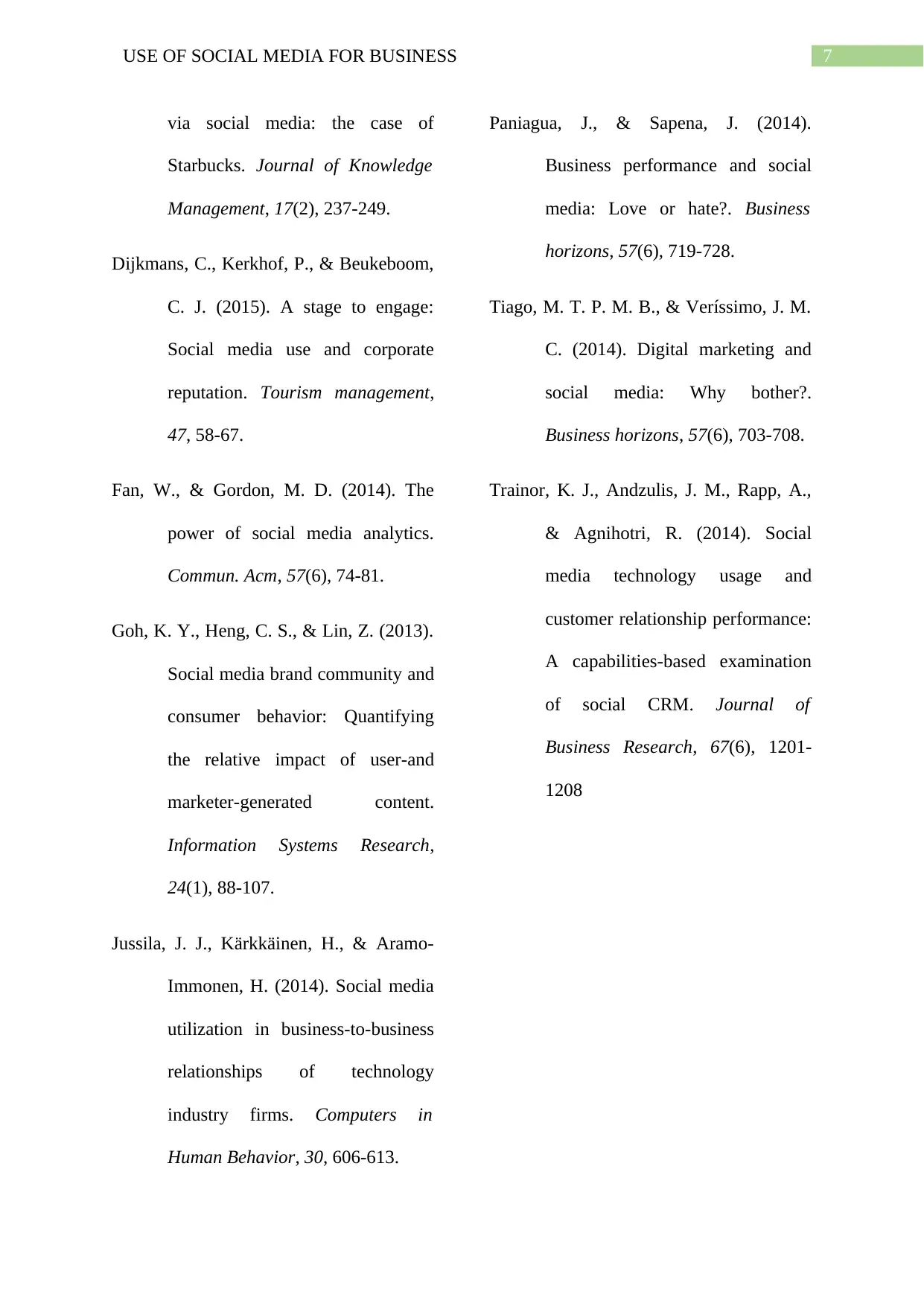
7USE OF SOCIAL MEDIA FOR BUSINESS
via social media: the case of
Starbucks. Journal of Knowledge
Management, 17(2), 237-249.
Dijkmans, C., Kerkhof, P., & Beukeboom,
C. J. (2015). A stage to engage:
Social media use and corporate
reputation. Tourism management,
47, 58-67.
Fan, W., & Gordon, M. D. (2014). The
power of social media analytics.
Commun. Acm, 57(6), 74-81.
Goh, K. Y., Heng, C. S., & Lin, Z. (2013).
Social media brand community and
consumer behavior: Quantifying
the relative impact of user-and
marketer-generated content.
Information Systems Research,
24(1), 88-107.
Jussila, J. J., Kärkkäinen, H., & Aramo-
Immonen, H. (2014). Social media
utilization in business-to-business
relationships of technology
industry firms. Computers in
Human Behavior, 30, 606-613.
Paniagua, J., & Sapena, J. (2014).
Business performance and social
media: Love or hate?. Business
horizons, 57(6), 719-728.
Tiago, M. T. P. M. B., & Veríssimo, J. M.
C. (2014). Digital marketing and
social media: Why bother?.
Business horizons, 57(6), 703-708.
Trainor, K. J., Andzulis, J. M., Rapp, A.,
& Agnihotri, R. (2014). Social
media technology usage and
customer relationship performance:
A capabilities-based examination
of social CRM. Journal of
Business Research, 67(6), 1201-
1208
via social media: the case of
Starbucks. Journal of Knowledge
Management, 17(2), 237-249.
Dijkmans, C., Kerkhof, P., & Beukeboom,
C. J. (2015). A stage to engage:
Social media use and corporate
reputation. Tourism management,
47, 58-67.
Fan, W., & Gordon, M. D. (2014). The
power of social media analytics.
Commun. Acm, 57(6), 74-81.
Goh, K. Y., Heng, C. S., & Lin, Z. (2013).
Social media brand community and
consumer behavior: Quantifying
the relative impact of user-and
marketer-generated content.
Information Systems Research,
24(1), 88-107.
Jussila, J. J., Kärkkäinen, H., & Aramo-
Immonen, H. (2014). Social media
utilization in business-to-business
relationships of technology
industry firms. Computers in
Human Behavior, 30, 606-613.
Paniagua, J., & Sapena, J. (2014).
Business performance and social
media: Love or hate?. Business
horizons, 57(6), 719-728.
Tiago, M. T. P. M. B., & Veríssimo, J. M.
C. (2014). Digital marketing and
social media: Why bother?.
Business horizons, 57(6), 703-708.
Trainor, K. J., Andzulis, J. M., Rapp, A.,
& Agnihotri, R. (2014). Social
media technology usage and
customer relationship performance:
A capabilities-based examination
of social CRM. Journal of
Business Research, 67(6), 1201-
1208
1 out of 7
Related Documents
Your All-in-One AI-Powered Toolkit for Academic Success.
+13062052269
info@desklib.com
Available 24*7 on WhatsApp / Email
![[object Object]](/_next/static/media/star-bottom.7253800d.svg)
Unlock your academic potential
Copyright © 2020–2025 A2Z Services. All Rights Reserved. Developed and managed by ZUCOL.





